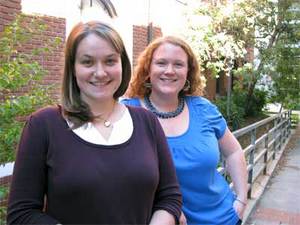
By Andrew Cohen
A fast-growing number of Berkeley Law students are gaining valuable hands-on experience with the California Asylum Representation Clinic (CARC). Collaborating closely with the East Bay Sanctuary Covenant since 1995, CARC trains students to serve as legal advocates for asylum seekers from all over the world.
Last year, 117 students participated in the program, representing clients from Guatemala, Mexico, Cameroon, Liberia, El Salvador, Peru, China, Myanmar, Liberia, Sierra Leone, CoteD’Ivoire, Nepal, Sri Lanka , Mali, Mongolia, Nigeria, Tibet, and Eritrea in their affirmative asylum interviews. That group included 94 1Ls—more than one-third of the entire first-year class—and 33 more than the previous high in CARC’s history. Even more impressive, the clinic obtained successful verdicts in 93 percent of its cases.
Further strengthening the clinic’s future is a partnership forged between CARC Coordinator Lindsay Harris ’09 and Jayne Fleming ’00, pro bono counsel at Reed Smith and the head of the law firm’s human rights team. Starting this year, Reed Smith provides CARC financial sponsorship, mentoring, and assistance with training programs—putting the clinic in a strong position to support its student advocates.
“We’re trying to build CARC the right way and prepare people to do this important work as comprehensively and thoughtfully as possible,” Harris says. “The way I see it, changing somebody’s life by using the skills you gain in law school, that’s what it’s all about.”
In May, Harris won a UC Berkeley Golden Circle Outstanding Student Leader Award for noteworthy contributions to the university and her willingness to lead and create opportunities for others to lead. Fleming has earned numerous honors for her asylum work, and was named one of America’s 50 most influential women last year by the National Law Journal.
Adding “human dimension” to law school
“Law can be hard and insulating for first-year students,” Fleming says. “To be able to add a human dimension to that experience and say, ‘Hey, let’s go save a life,’ that really resonates.”
This year CARC’s training coordinators, Anna Sanders and Rebecca Nichols, have worked to create a more comprehensive training program—including sessions on basic asylum law, interviews, the asylum process, the one-year bar, working with survivors of trauma, country conditions, and gender-based asylum claims. These trainings bring in asylum practitioners and experts to train law students how to best represent their clients.
Mentor program coordinator Melinda Pilling has been instrumental in creating a program for second- and third-year students to remain involved in CARC as mentors for first-year students working directly with the clients. The 2L and 3L students receive support from Reed Smith and community mentor attorneys.
On a recent Thursday afternoon, about 30 CARC students listened as Michael Smith of the Sanctuary Covenant and attorney Allison Davenport from Centro Legal de la Raza offered tips and strategies for working with Guatemalan refugees, thousands of whom fled the country to the U.S. during and after a brutal civil war that ended in the 1990s.
Although the war is over, some asylum seekers face other, new dangers in their home country, Davenport said, including brutal killings of women (called “femicide”) and gang violence.
“Think outside the box,” she said. “We’re talking about these traditional cases, but there are other trends in asylum law you want to explore.’’
Student Amy Endicott ’11 was drawn to the clinic partly because she was a Latin American studies major as an undergraduate. But she also noted that much of what she’s studying in law school now doesn’t draw clear distinctions between right and wrong.
“The asylum clinic,’’ she said, ‘’gives me a chance to work in an area of law where it’s the right thing because these people have been wronged.’’
Current or prospective students may contact the clinic at cdnorris@berkeley.edu for more information.